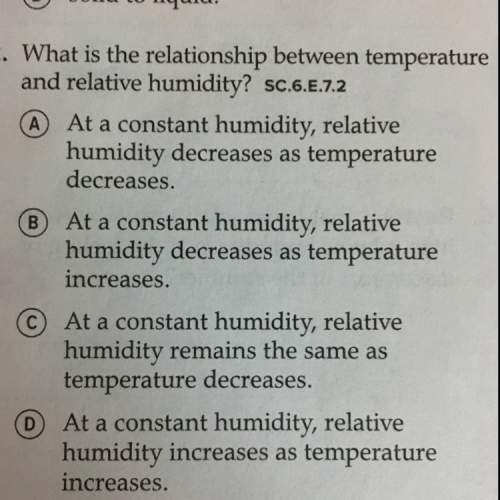Ireally need !
the concentration of salt is higher inside a cell than outside the cell....

Biology, 09.10.2019 01:30 panishreyashi
Ireally need !
the concentration of salt is higher inside a cell than outside the cell. the concentration of water inside the cell is lower than it is outside. salt cannot pass through the cell membrane.
what will happen to the concentrations of water and salt?
a.
water will move into the cell through diffusion. the salt concentration will be greater inside than outside.
b.
water will move out of the cell through diffusion. the salt concentration will be less inside than outside.
c.
water will move into the cell through osmosis. the salt and water concentrations will become similar inside and outside the cell.
d.
water will move out of the cell through osmosis. the salt and water concentrations will become similar inside and outside the cell.

Answers: 1


Another question on Biology

Biology, 21.06.2019 19:00
Which of the following structures is not found in both plant and animal cells? a) chloroplast b) cytoskeleton c) ribosomes d) mitochondria
Answers: 2

Biology, 21.06.2019 21:00
1. environmental factors, such as ph and temperature, can affect the function of an enzyme. a. true b. false 2. which of the following is an organic molecules (ex. vitamins) that an enzyme? a. coenzyme b. product c. active site d. substrate 3. how do enzymes effect the speed of a chemical reaction? a. they speed it up b. they slow it down c. they have no effect on the speed of a reaction 4. during a chemical reaction, an enzyme is used up so that it can only be used one time. a. true b. false 5. which of the following results from a chemical reaction that is catalyzed by an enzymes? a. active site b. product c. substrate d. coenzyme
Answers: 3

Biology, 22.06.2019 08:20
10111213141516lactic acid fermentation differs from ethyl alcohol fermentation in thato in ethyl alcohol fermentation co2 is also producedlactic acid fermentation can occur in all living thingsethyl alcohol fermentation can only occur in plantsonly lactic acid fermentation can produce more atp
Answers: 1

Biology, 22.06.2019 13:20
Imagine a self-reactive t cell that has not undergone clonal deletion in the thymus (that is to say, it has escaped central tolerance). if it encounters self antigen in the absence of an infection or inflammation, what will happen to this self-reactive t cell? (select two answers) (a) the t cell undergoes clonal expansion. (b) the t cell gains effector functions. (c) the t cell undergoes apoptosis. (d) the t cell becomes activated. (e) the t cell becomes anergic.
Answers: 1
You know the right answer?
Questions


Biology, 06.10.2019 16:00

Chemistry, 06.10.2019 16:00


Chemistry, 06.10.2019 16:00




Social Studies, 06.10.2019 16:00


Biology, 06.10.2019 16:00

Biology, 06.10.2019 16:00

Chemistry, 06.10.2019 16:00

Mathematics, 06.10.2019 16:00


Physics, 06.10.2019 16:00

History, 06.10.2019 16:00

Chemistry, 06.10.2019 16:00

Mathematics, 06.10.2019 16:00

Social Studies, 06.10.2019 16:00





